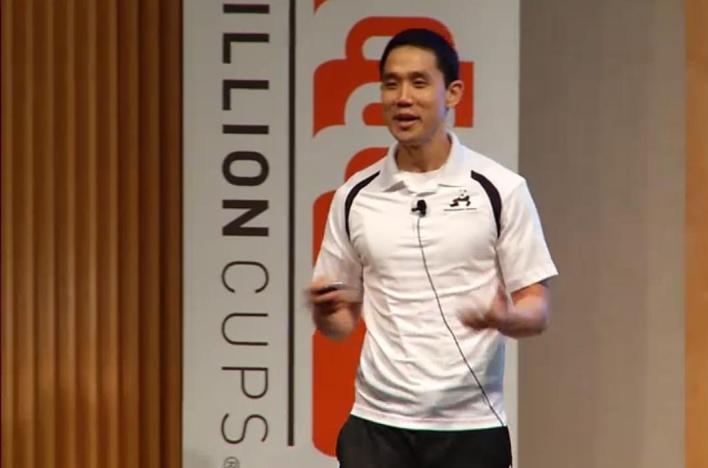This week’s 1 Million Cups at the Kauffman Foundation featured startups pitching a mobile app-centered wash-and-fold laundry service and a website for selling cars that doesn’t charge dealers for sales leads.
The guest panel of inquisitors included Michele Markey, vice president of Kauffman FastTrac; Tom Morse-Brown of Morse-Brown Design; and Jerry Glazier, a veteran business executive with experience in both the for-profit and nonprofit sectors.
Panda Laundry at 1 Million Cups
Making his ninth presentation to an audience in the 1 Million Cups network of cities was Panda Laundry Factory founder Samson Yi from Springfield, Mo. He said that his company was poised to lead the “next revolution in wash and fold” laundry service.
“Most people hate doing their own laundry and would rather have someone else do it for them,” Yi said. But most people can also do their own launder faster, better and cheaper, he said, until they try Panda Laundry Factory.
Panda Laundry Factory’s franchise model offers consumers a mobile app that allows for total customization of how their laundry is done and will have it finished and securely packaged for pickup in less than two hours.
The cost to acquire a Panda Laundry Factory franchise is a $3 million capital investment for a 3,500-square-foot facility that features a highly specialized mechanical conveyer system for laundry processing. The company’s key markets are busy mothers, Yi said, and young men who don’t want to do laundry in the first place.
What’s the cost to the consumer? “I believe you can charge $15 to $20 for a full week’s worth of laundry,” Yi said.
Panda Laundry Factory’s objective is to scale up as a major player in the still-emerging mobile-app laundry services market. Then Yi would like to sell to a multinational company such as Procter & Gamble, which would be a great fit because of its laundry detergent and related products, he said.
Make It Easy Autos at 1 Million Cups
Next up was Nick Penka, founder of Make It Easy Autos, who discussed his online car marketplace where dealers pay only for sales and not for the generation of sales leads.
With a business model inspired by Walmart—to offer a variety of products at low prices—Penka’s pitch centered on making available as many cars as possible on the Make It Easy Autos website by getting as many dealers selling cars on the site as possible.
He said that Make It Easy Autos appeals to car dealers because, after paying a one-time $850 fee to get their inventory on the site, they only pay again when they sell a car. The fee to dealers for each car sold is $350. Currently, 59 dealers have signed up to sell cars on the site, which now offers 14,000 cars. The most popular price range for cars sold on the site is $5,000 to $12,000.
The appeal of Make It Easy Autos to consumers, Penka said, was mainly two-fold. First, users can enter their monthly car-payment budget on Make It Easy Auto’s website, and they’ll be shown vehicles in their price range. Plus, this system helps protect consumers from dealer sales calls.
“Our thought process,” Penka said, “is to introduce the consumer to a new set of cars that fits within the range of what they can afford, and then they can go out and look at them.”


